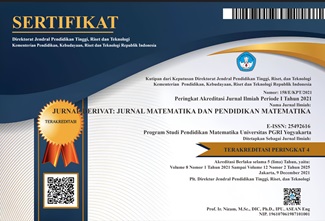Pengembangan Modul Pembelajaran Kalkulus 1 Berbasis Problem Based Learning Di STMIK Duta Bangsa
DOI:
https://doi.org/10.31316/j.derivat.v4i1.162Abstract
The purpose of this research is to develop module Calculus 1 based on the problem based learning that valid, practical, and effective in Calculus 1 at Information Engineering of STMIK Duta Bangsa. This research is development research using 4D model. The steps are defined, design, develop, and disseminate. The define steps are syllabus and textbook analysis, review of the literature, and interview about lesson and college student about learning in the classroom. The design step is the design of workbook. The developing steps are consists of validation, praktikalitas, and effectiveness. After designed, the workbook will be validated by the validator. At the praktikalitas step, workbook was tried out to students semester 1 Â of Information Engineering in STMIK Duta Bangsa. This event will be observed by an observer. The effectiveness of workbook observed at the same time with praktikalitas steps. The effect that observed were the activities and student learning outcomes. The technique of collecting data was done by validation sheet, observation sheet, field notes, and an interview. The data were analyzed using the descriptive set. The dissemination step was spread of the product. The outer of this research is a prototype, model, module of Calculus 1 and national journal publication. The result showed that the module of Calculus 1 was having validity very valid by content and construct. According to observation and interviews, note showed that module Calculus 1 was already practical and easy to used by students. The module of Calculus 1 is effective according to the study and observation activity students. This research was indicated that by using modules can improving activity and learning outcomes students.
Keywords: module, problem-based learning, Kalkulus 1Downloads
Published
Issue
Section
Citation Check
License
Authors who publish with this journal agree to the following terms:
-
Authors retain copyright and grant the journal right of first publication with the work simultaneously licensed under a Creative Commons Attribution-ShareAlike 4.0 International License that allows others to share the work with an acknowledgment of the work's authorship and initial publication in this journal.
- Authors are able to enter into separate, additional contractual arrangements for the non-exclusive distribution of the journal's published version of the work (e.g., post it to an institutional repository or publish it in a book), with an acknowledgment of its initial publication in this journal.
- Authors are permitted and encouraged to post their work online (e.g., in institutional repositories or on their website) prior to and during the submission process, as it can lead to productive exchanges, as well as earlier and greater citation of published work (See The Effect of Open Access).







